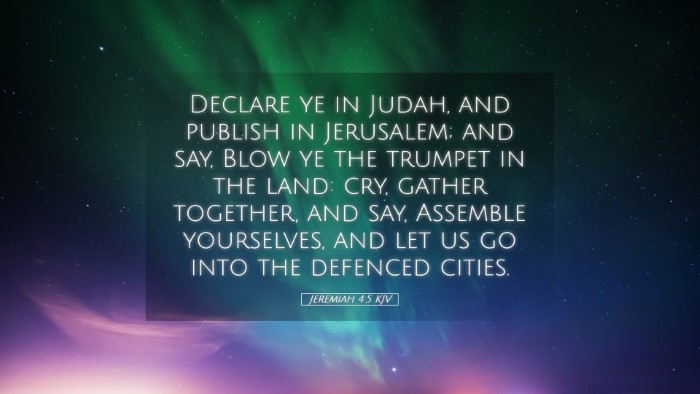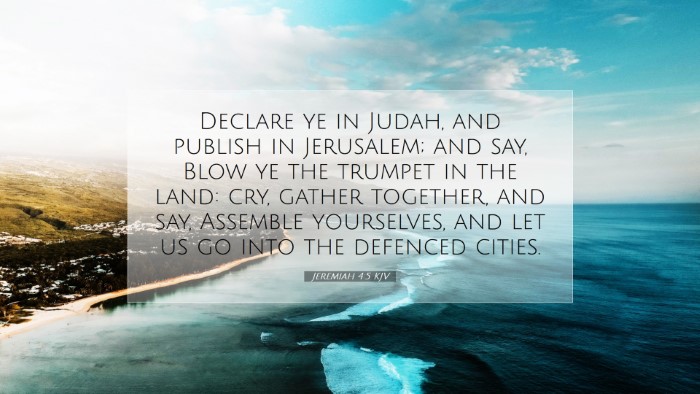Commentary on Jeremiah 4:5
Jeremiah 4:5 states:
"Declare ye in Judah, and publish in Jerusalem; and say, Blow ye the trumpet in the land: cry, gather together, and say, Assemble yourselves, and let us go into the defenced cities."
Introduction
This verse occurs within the context of Jeremiah’s prophetic warning to the people of Judah concerning impending judgment and destruction. The urgency of the call reflects the dire situation that Judah finds itself in, as the Babylonians are on the verge of invasion. This commentary synthesizes insights from Matthew Henry, Albert Barnes, and Adam Clarke, offering a rich examination of the historical, theological, and practical implications for pastors, students, and theologians.
Exegetical Insights
Contextual Background: Before delving into the specifics of the verse, it’s essential to understand Jeremiah’s role as a prophet during a critical period in Judah's history. This was a time of moral decay and prophetic silence, leading to a climactic moment when God chose to announce judgment through Jeremiah, the “weeping prophet.”
Matthew Henry’s Perspective
Matthew Henry emphasizes the call to declaration in this verse. He notes:
- The imperative for Jerusalem reflects both a geographical and spiritual urgency.
- The exhortation to "blow the trumpet" signals the seriousness of the situation; the trumpet is a biblical symbol of alarm and announcement.
Henry likens this to a clarion call to awaken the people from their spiritual lethargy, highlighting that Judah must be prepared for the coming storm.
Albert Barnes’ Commentary
Albert Barnes elaborates on the metaphorical implications of “defenced cities.” He interprets them as places of refuge against incoming threats, which could also symbolize the false security the people placed in their own fortifications.
Barnes expresses that the call to assemble conveys God’s desire for unity and collective responsibility among His people. He warns that the people's reliance on their strength will ultimately fail them, emphasizing a theological principle: true security comes only from God.
Adam Clarke’s Insights
Adam Clarke provides a detailed analysis of the verbs used in this passage. He points out that the call to declare and gather is not merely a military instruction but serves a broader purpose of spiritual awakening.
- Clarke suggests this gathering represents a last opportunity for repentance and readiness to seek God’s mercy.
- The mention of "the trumpet" in the context of war initiates a reflection on spiritual warfare and readiness.
He stresses the importance of listening and responding to God’s call, asserting that neglect in addressing spiritual issues leads to devastation.
Theological Themes
This verse presents several notable theological themes that are illuminating for modern readers and scholars:
- Divine Judgment: The warning tone of this verse ties into a larger narrative of prophetic warnings throughout Scripture addressing human sin and divine holiness.
- Call to Repentance: The assembly suggests a collective act of penitence, where God's people are summoned to address their sins.
- Community Responsibility: This communal call signifies that the consequences of sin extend beyond the individual, affecting the entire community.
Applications for Today
The implications of Jeremiah 4:5 remain profoundly relevant for contemporary Christian life:
- Awakening the Church: Like Judah, modern churches often face apathy and complacency, needing a prophetic voice to call them back to vigilance and faithfulness.
- The Importance of Sounding the Alarm: Pastors and church leaders carry the responsibility to warn their congregations about moral and spiritual decay, echoing the urgency present in Jeremiah's message.
- Unity in Crisis: The call to gather reflects an invitation for the church to unite in the face of societal challenges, reinforcing the idea that collective prayer and action can lead to transformation.
Conclusion
Jeremiah 4:5 serves as both a historical message and a timeless warning, calling all to a sense of urgency in the face of impending judgment and the need for communal repentance. The insights from Matthew Henry, Albert Barnes, and Adam Clarke together illuminate the multifaceted nature of God’s message through Jeremiah. Today, as we reflect on this verse, may we be inspired to act, awaken, and gather as we respond to God's voice in our lives and communities.


